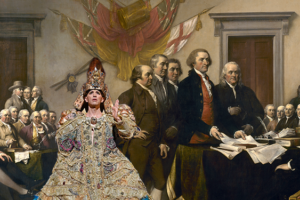

His mother was in the city that weekend visiting from Sarasota, Jesus’ hometown. Macy’s was her idea. Silently watching her son sort through the mess of garments and trailing him across the department store linoleum, Concepción at first appeared a martyr—withdrawn, sullen, forlorn—although in time (and as was often the case), her feelings would H-bomb, dispensing smoky plumes of hostile resentment.
“¡Jesucristo en la cruz con salpicaduras de mierda!” she exclaimed as they approached the store’s long and winding checkout line. “Have you ever seen anything like this? And only one burro at the register!”
Jesús looked up from his phone and shrugged at Concepción.
“Give me that,” she cried, snatching the sweater from his hands. She cut the line and stormed up to counter, a chorus of boos and hisses underscoring her angry demonstration and causing Jesús to blush. He caught up to her just before she could give Salami, the uneasy, crystal-gel-nailed salesclerk, a piece of her mind.
“I’m so sorry,” he apologized, pushing his mother aside and thrusting a credit card at Salami so the encounter would go away. He shrugged nervously at everyone as they left the store.
An hour later, hunched over hamburgers down the street, Jesús was telling Concepción about a potential promotion at work.
“…and then Tristan takes me out for drinks, tells me about a team principal they’re looking for in new business sales. I think I’d be pretty good for it, but I know it’s a lot of responsibility, a huge time commitment, a lot of people I’d have to mentor. I hate to think of kissing my social life goodbye, you know? Because I wouldn’t have evenings anymore. And my trainer…”
He trailed off, noticing for the first time that his mom was in tears.
“Hey, are you okay?”
Concepción blubbered. “¡Lengua larga! Does it look like I’m okay?”
“What’s wrong, ma? You’ve been acting upset all day.”
“It’s your father. He’s… He’s…” She trailed off.
“He’s what? Tell me.”
“He’s… leaving our marriage.”
Jesús could hear the sorrow in his mother’s voice as she fought back hysterics. He thought it better to just sit and listen.
“It’s too much. Shmuely has decided that he’s…”
“…He’s what?”
“He’s decided that he wants to live his life as Shmuelina.”
Concepción dropped her burger and blew her nose loudly into a napkin. Jesús was stunned, thinking perhaps he’d misheard.
“As what?”
“Shmuelina. He’s a—what do you call it? A trans…”
“A transgender person?”
“Sí, he’s a manocha.”
“Ma, you can’t use that language. How did you find this out?”
“It all happened so fast. It was last week. I came home one day, and he answered the door wearing my silver necklace and vestido, the yellow one with the flowers I wore to your sister’s quince. I went blind! Gloria Estefan was playing in the background, that’s all I knew.”
“Dad?”
“You can’t believe it either. How could you? This is such a shock to our family. I shouldn’t have told you.”
“What do you need me to do?” Jesús asked. “I’ll help you however I can.”
“Jesús, your mama begs you, talk some sense into him.”
“Listen, maybe we can work this out as a family? If I can find acceptance as a gay man, there’s no reason we can’t find a place for him too.”
His mother’s eyes widened in astonishment.
“Wait. You’re… gay?”
That evening, not an hour before his best friend called with the frantic news, Evan Ingersoll sat meditatively in his room, alone with his thoughts.
Yesterday he’d learned that he would be a supernumerary for the Big Apple Singing Theater Association. A small miracle, he knew that this meant big things for his love of opera: he would be learning not only what it meant to be the form’s star-struck consumer, but also what it meant to be producing the art for the very public he’d been a part of for so long. The electricity generated by this change of position was already hugely exciting for him!
And yet. As he gazed around the room at his opera posters, memorabilia, and at all those beaded necklaces he’d earned at Mardi Gras ago in New Orleans, the mysteries of fandom to him felt even more imminent.
What would it mean to love a singing diva when you’re onstage in character with her? Does the adulation disappear, or subvert, or turn into something else completely? What exactly might an opera-lover look like, viewed not from the audience, but from the proscenium? Adorable? Endearing? Oppressive? Perverted?
And the music, how different it must sound: echoing and swirling beneath you like so much dry ice; supporting your actions, instead of coming at you, underscoring your passive enjoyment like a river.
Of course, there would be several opportunities for comparison in the meantime. Before Bison Don’t Cry, after all, two big season blockbusters—Algonquin’s thrillingly ill-fated, newly conductor-less Lucia and BASTA’s season opener, La fanciulla del West—were about to premiere. Evan had heard incredible things about both shows.
And if Twitter was to be believed, New York’s edgy pantheon of professional opera reviewers were at the ready, poised with their pens, and every bit as eager to critique as he was.
Illustration by Ben A. Cohen























Comments